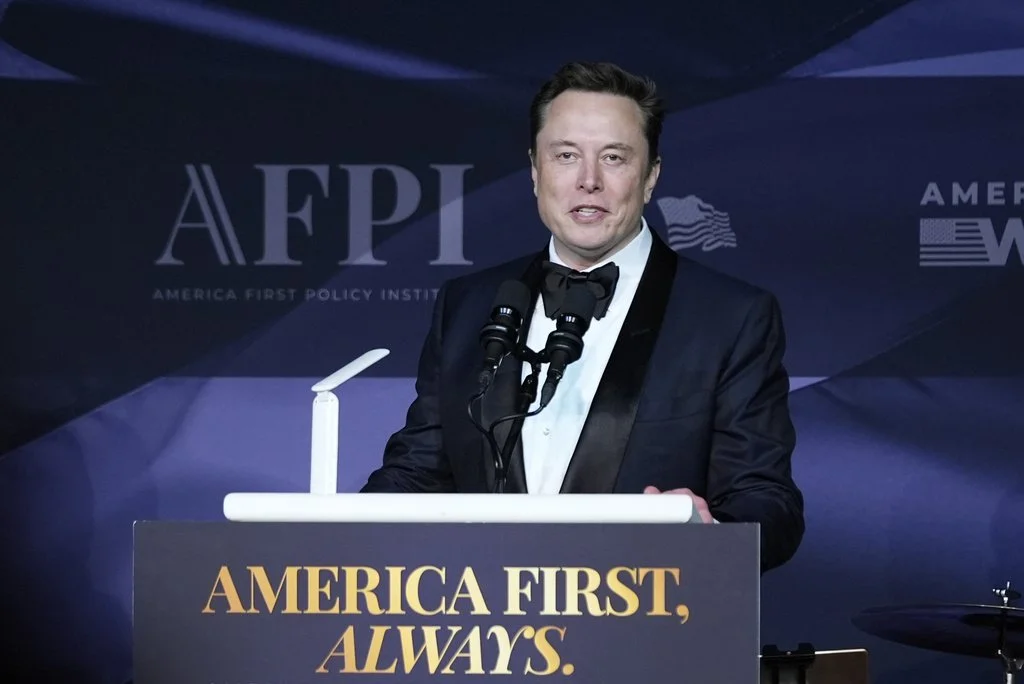How Elon Musk’s Unconventional Role Could Shape the Trump Administration’s Approach to Iran
Elon Musk delivers a speech following President-elect Trump at his Mar-a-Lago estate, Thursday, Nov. 14, 2024. (Photo: AP Photo/Alex Brandon)
As the United States prepares for another Trump administration to assume power in 2024, the nation faces significant political shifts. With complete control of Congress and a majority on the Supreme Court, Donald Trump’s Republican party is positioned to enact sweeping policies both domestically and internationally. Often portrayed as a unitary figure who acts solely on his own will, Trump’s rise to the presidency this time has been notably accompanied by someone right by his side: billionaire Elon Musk, owner of Tesla, SpaceX, and X, formerly known as Twitter. While many might assume Musk’s close alignment with Trump focuses on domestic issues to benefit his businesses, recent reports suggest an unexpected twist. Musk, a private citizen, reportedly held a meeting with Iran’s UN ambassador, hinting at an unprecedented role in shaping US foreign policy under the new administration.
Since President-elect Trump will be only the second US president to serve two non-consecutive terms, it is crucial to examine his approach to foreign policy with Iran during his first presidency. In 2018, Trump withdrew from the 2015 Iran nuclear deal brokered by the Obama administration and other foreign powers. Trump then reimposed severe economic sanctions on Iran. The election of Joe Biden, who worked with Obama to achieve the deal, temporarily reversed some of Trump’s policies. However, Trump’s return to the White House signals a revival of his “maximum pressure” strategy, with the United States expected to double down on its hardline economic isolation of Iran.
Critics of Elon Musk’s meeting with Iran’s UN ambassador are asking the same question many others are: “Where does Elon Musk fit into all of this?” According to Iranian officials, the meeting reportedly focused on “future cooperation.” However, details regarding the meeting are scarce, and critics argue that a private citizen negotiating with Iran’s UN ambassador — rather than the state department — could send mixed signals about the administration’s goals and who truly holds power in the American government.
Along with his meeting with Iran’s UN ambassador, Musk reportedly participated in a call between President-elect Trump and Ukrainian President Volodymyr Zelensky. While some might view Musk’s eager participation in shaping international relations under the incoming administration as an asset, others warn of the risks associated with entrusting critical foreign policy matters to a private citizen without formal diplomatic experience.
Elon Musk and then then-presidential candidate Donald Trump at a campaign event at the Butler Farm show on Oct. 5, 2024. (Photo: AP Photo/Alex Brandon)
Musk’s company, SpaceX, operates Starlink, a revolutionary satellite that enables internet access across the globe, which is crucial during geopolitical crises such as the war in Ukraine. It is no surprise, then, that Iran’s leadership has shown interest in Musk due to his role in technological innovation, especially in renewable energy and satellite communications. Iran may aim to use its relationship with Musk — and more importantly, his technological resources — as a potential method of bypassing US-led sanctions. This further adds to the mixed signals surrounding the Trump administration’s hierarchy and its stance on foreign policy.
Musk’s inclusion in shaping US foreign policy marks a shift in how diplomacy is conducted in the 21st century and beyond. Whether his involvement proves to be a success, a catastrophic failure, or somewhere in between remains to be seen. One thing, however, is certain: Musk’s involvement will serve as a strong indicator of how the private sector and the geopolitical stage will continue to intersect in the future.


